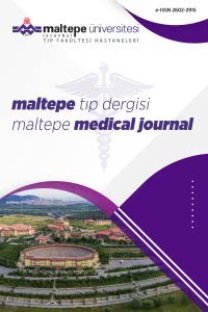Maltepe Üniversitesi Tıp Fakültesi Öğrencilerinin Genetiği Değiştirilmiş Organizmalar Hakkında Bilgi Tutum ve Davranışları
Genetiği değiştirilmiş organizmalar, risk algısı, Tıp Fakültesi öğrencileri
Knowledge Attitude and Behavior of the students in Medical School of Maltepe University About Genetically Modifi ed Organisms
___
- Food Safety Department (WHO). 2005. Modern food biotechnology, human health and development: an evidence-based study. http://www.who.int/foodsa- fety/publications/biotech /biotech_en.pdf [Eriēim tarihi: 27.03.2007]
- World Health Organisation. Food Safety Department. 20 Questions on genetically modiŞ ed_(GM)_foods._ 2007._http://www.who.int/ foodsafety/publications/biotech/ en/20questions_en.pdf_[Eriēim_tarihii:_11/07/2007].
- Altındiēli A, Sındır K. Organik tarım ve GDO’lara bakıē açısı. Ekolojik Tarım Organizasyonu DerneĒi._http:// www.tedgem.gov.tr/yayim/e_orga nik_sunu.htm [Eriēim tarihi: 11/07/2007].
- Maclean N. 5. Genetically modiŞ ed Ş sh and their effects on food quality and human health and nutrition. TrendsFood Sci Technol. 2003; 14: 242-252.
- International Service for the Acquisition of Agri- Biotechnology Applications , http://www.isaaa.org, July2005.
- Study, Strong Growth for Biotech Crops, Europe- an Biotechnology Science&Industry News, 4 (1-2), 5, 2005.
- Kıyak S., Genetik Olarak DeĒiētirilmiē Gıdalar, Car- tagena Biyogüvenlik Protokolü ve Türkiye’de Durum(1), Çevreye Genç Bakıē, 2004; 4: 14-22.
- Kıyak S., Genetik Olarak DeĒiētirilmiē Gıdalar, Car- tagena Biyogüvenlik Protokolü ve Türkiye’de Durum(2), Çevreye Genç Bakıē, 2004; 5, 1-20.
- Çelik V,Turgut D.Balık, Erciyes Üniversitesi Fen Bi- limleri Enstitüsü Dergisi 2007; 23: 13 - 23.
- Yanaz S., Genetik Olarak DeĒiētirilmiē Organizmalar (GDO) Konusu ve Cartagene Biyogüvenlik Protokolü,T. C. Baēbakanlık Dıē Ticaret MüsteēarlıĒı Dergisi
- http://www.dtm.gov.tr/ead/DTDERGI/nisan2003/ge- netik.htm, 2003.
- Ahmed F.E., Detection of Genetically ModiŞ ed Organisms in Foods, Trends in Biotechnology, 2002; 20: 215-223.
- Whitney S.L., et al., “This Food May Contain…” What Nurses Should Know About Genetically Engine- eredFoods, Nursing Outlook, 2004; 52: 262-266.
- TüysüzoĒlu B.B, et al., Türkiye’de GDO, Bilim ve Teknik, 2004; 443: 36-43.
- Günaydın G. (Ziraat Müh. Odası Genel merkez- yayını). 2004. GDO: Türkiye yararına mı?
- http://www.zmo.org.tr/genel/bizden_detay.php?kod=1 53&tipi=5&sube=0 [Eriēim tarihi:15.05.2007]
- Ziraat Müh. Odası Genel merkez yayını. 2007. STK’lar bastırdı, GDO talimatı kaldırıldı.
- http://www.zmo.org.tr/genel/bizden_detay.php[Eriēi mtarihi:15.05.2007]
- Eurobarometer, European Commission.2006. Special EUROBAROMETER 238 “RiskIssues”. Risk Is- sues Executive Summary on FoodSafety._http://www. bfr.bund.de/cm/221/risk_issues_executive_summary_ on_food_safety.pdf[Eriēim tarihi:15.05.2007].
- http://ec.europa.eu/food/food/biotechnology/gmo_la- belling_en.htm(Eriēimtarihi:02.02.2010)
- M.K., Hursti, U.K.K. Consumer attitudes towards genetically modiŞ ed foods. Appetite 39:9-24.M.K., Hursti, U.K.K. 2002. Consumer attitudes towards genetically modiŞ ed foods. Appetite 2002; 39: 9-24.
- Demir A, Pala A, GenetiĒi DeĒiētirilmiē Orga- nizmalara Toplumun Bakıē Açısı, Hayvansal Üretim Dergisi, 2007; 48: 33-43.
- Ergin I, Gürsoy đT, Öcek ZA, ÇiçeklioĒlu M. SaĒlık Meslek Yüksekokulu ÖĒrencilerinin GenetiĒi DeĒiētirilmiē Organizmalara Dair Bilgi Tutum ve Davranıēları. TAF Prev Med Bull. 2008; 7: 503-508.
- Zhong F., Marchant, M.A., Ding, Y., & Lu, K. (2002). GM foods: A Nanjing case study of Chinese consumers’ awareness and potential attitudes. AgBi- oForum, 2002; 5: 136-144. Available on the World Wide Web: http://www.agbioforum.org.
- Wen S. Chern and Kyrre Rickertsen “Consumer Acceptance of GMO:Survey Results from Japan, Norway, Taiwan, and the United States” Taiwanese Agricultural Economic Review, 2001; 7: 1-28.
- Yayın Aralığı: Yılda 3 Sayı
- Başlangıç: 2009
- Yayıncı: Maltepe Üniversitesi
Dr.keskin Y, Dr.lüleci N E, Dr.özyaral O, Altıntaş Ö, Sağlık A, Lisar H, Turan A, Top Y
Öner ÇELİK, Zerrin BOYACI, M. Öncel KOCA, Hakan KARA
Midenin Kötü Differansiye Medüller Karsinomu: Olgu Sunumu
Ahmet MİDİ, Çiğdem ATAİZİ ÇELİKEL, Funda TANAY EREN
Yaygın Gelişimsel Bozukluklarda Güncel Antipsikotik Kullanımı
İlter E, Çelik A, Haliloğlu B, Ercan G, Yücel E, Bozkurt S, Özekici Ü
Toraks Tüpünün Yetersiz Kaldığı Ampiyemli Olgularda BT Eşliğinde Perkütan Kateter Drenaj Uygulaması
Abdurrahim DUSAK, Gökhan GÖKALP, Metin DOĞAN, Tamer BAYSAL
Erişkinde Hepatit - A: Olgu Sunumu
Apseden İzole Edilen Streptococcus Constellatus Olgu Sunumu
Ahmet BALIKÇI, Manuk MANUKYAN, Uğur DEVECİ, Aynur TOPKAYA
Rahim içi Araç Kullanan Kadınlarda Gelişen Menorajinin Uterin Kan Akımı İle İlişkisi
Berna HALİLOĞLU, Aygen ÇELİK, Erdin ILTER, Tonguç GÜNDÜZ, Serpil BOZKURT, Ümit ÖZEKİCİ
